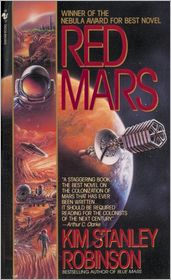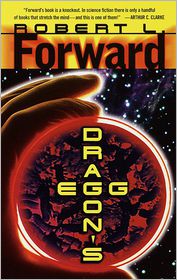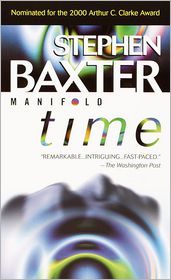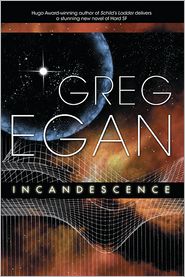5 Books That Resist the Handwave with Believable Futuristic Technology
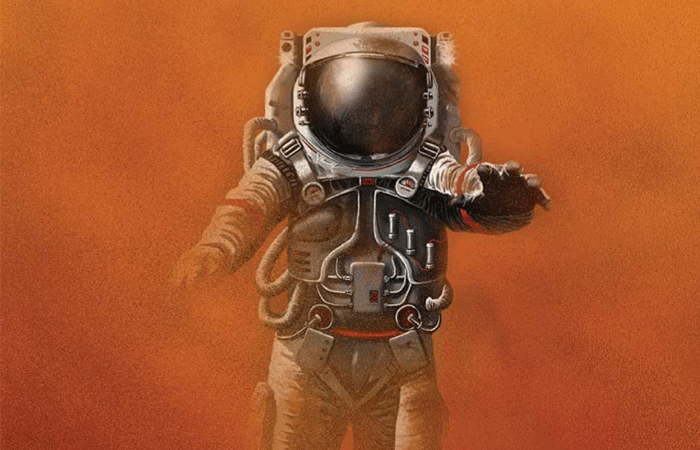 The Handwave is a powerful thing is sci-fi: the ability to fix a problem with a science-y sounding solution that isn’t even remotely plausible (Doctor Who has been riding high on the the immense power of the Handwave for more than five decades). There’s nothing wrong with this, but it can occasionally tug at the brain a little (the TARDIS is a incredibly complex piece of technology manned by someone who clearly has no idea how to operate it properly, and yet it has had exactly zero tune-ups in all that time? …Ok.).
The Handwave is a powerful thing is sci-fi: the ability to fix a problem with a science-y sounding solution that isn’t even remotely plausible (Doctor Who has been riding high on the the immense power of the Handwave for more than five decades). There’s nothing wrong with this, but it can occasionally tug at the brain a little (the TARDIS is a incredibly complex piece of technology manned by someone who clearly has no idea how to operate it properly, and yet it has had exactly zero tune-ups in all that time? …Ok.).
If you’re of the sort who likes to see authors make at least a cursory attempt at supporting the magical technology in their novels, here are 5 sci-fi novels books that resist the Handwave.
Red Mars
Red Mars
Paperback $8.99
The Mars Trilogy, by Kim Stanley Robinson
The result of both meticulous research and good old-fashioned thoughtfulness, Robinson’s Mars Trilogy manages to take something that potentially bone-chillingly boring (the centuries-long effort to terraform and settle Mars) and make it into a fascinating, exciting, often shocking story of politics, economics, genetics, and very believable science. Robinson’s secret isn’t so much the plausibility of his science as it is the thoughtful way he explores its consequences, deftly avoiding the common problem of technology that exists in a vacuum, fulfilling only a specific need, with no unforeseen ripple effects. To say that’s not the case in this incredible series is a vast understatement.
The Mars Trilogy, by Kim Stanley Robinson
The result of both meticulous research and good old-fashioned thoughtfulness, Robinson’s Mars Trilogy manages to take something that potentially bone-chillingly boring (the centuries-long effort to terraform and settle Mars) and make it into a fascinating, exciting, often shocking story of politics, economics, genetics, and very believable science. Robinson’s secret isn’t so much the plausibility of his science as it is the thoughtful way he explores its consequences, deftly avoiding the common problem of technology that exists in a vacuum, fulfilling only a specific need, with no unforeseen ripple effects. To say that’s not the case in this incredible series is a vast understatement.
Dragon's Egg: A Novel
Dragon's Egg: A Novel
In Stock Online
Paperback $19.00
Dragon’s Egg, by Robert Forward
Perhaps the ultimate example that writing “hard,” scientifically rigorous fiction doesn’t exclude the possibility of a gripping narrative, Dragon’s Egg was described by its author as “a textbook on neutron star physics disguised as a novel.” In it, humanity discovers the Cheela, a race of intelligent beings evolving on a neutron star, where the environmental conditions mean each of their days lasts about 0.2 seconds—so the average Cheela lifespan is about 40 of our days. As humanity observes, then makes attempts to communicate with, the Cheela, we watch them evolve and develop incredibly quickly. The story of the Cheela’s growth from the very beginnings of agriculture to a technological society more advanced than our own takes exactly one month from the human perspective. Fascinating, and better still: The science behind this remarkable tale is very solid—theoretically, the Cheela could exist.
Dragon’s Egg, by Robert Forward
Perhaps the ultimate example that writing “hard,” scientifically rigorous fiction doesn’t exclude the possibility of a gripping narrative, Dragon’s Egg was described by its author as “a textbook on neutron star physics disguised as a novel.” In it, humanity discovers the Cheela, a race of intelligent beings evolving on a neutron star, where the environmental conditions mean each of their days lasts about 0.2 seconds—so the average Cheela lifespan is about 40 of our days. As humanity observes, then makes attempts to communicate with, the Cheela, we watch them evolve and develop incredibly quickly. The story of the Cheela’s growth from the very beginnings of agriculture to a technological society more advanced than our own takes exactly one month from the human perspective. Fascinating, and better still: The science behind this remarkable tale is very solid—theoretically, the Cheela could exist.
Manifold: Time (Manifold Series #1)
Manifold: Time (Manifold Series #1)
In Stock Online
Paperback $9.99
Manifold Series, by Stephen Baxter
The Fermi Paradox—the high probability the the universe is teeming with alien life, versus the fact that we’ve yet to find any evidence of it—is ripe material for a science fiction mystery. Baxter’s remarkable novels aren’t really a trilogy in the traditional sense, but rather they represent a “many worlds” approach to storytelling, with each book beginning with the goal of exploring Fermi’s Paradox, featuring the same characters, but presenting them with wildly different answers to the big question. In one, humans are the only life in the universe. In another, humans are just one of a near-infinite menagerie of life. And in the third, humans are alone, but exist in infinite parallel universes; thus, life is everywhere. The science in these books is theoretical, but no less rigorous for it; taken together, it’s among the most scientifically sound works of sci-fi ever written.
Manifold Series, by Stephen Baxter
The Fermi Paradox—the high probability the the universe is teeming with alien life, versus the fact that we’ve yet to find any evidence of it—is ripe material for a science fiction mystery. Baxter’s remarkable novels aren’t really a trilogy in the traditional sense, but rather they represent a “many worlds” approach to storytelling, with each book beginning with the goal of exploring Fermi’s Paradox, featuring the same characters, but presenting them with wildly different answers to the big question. In one, humans are the only life in the universe. In another, humans are just one of a near-infinite menagerie of life. And in the third, humans are alone, but exist in infinite parallel universes; thus, life is everywhere. The science in these books is theoretical, but no less rigorous for it; taken together, it’s among the most scientifically sound works of sci-fi ever written.
Incandescence
Incandescence
By Greg Egan
Paperback $14.95
Incandescence, by Greg Egan
Few science fiction novels can legitimately claim to be about the scientific process itself, but Incandescence can. The story presents readers with alternating timelines and points of view. The first is of a human in an incredibly advanced galactic civilization composed of different races, the second that of a member of a pre-industrial insectoid race living on a planet where mere existance is so precarious, their entire culture and society is centered on survival. As each timeline proceeds, it becomes clear that both protagonists are seeking answers and, despite their incredibly different circumstances, are pursuing them using the classic scientific method. As they make surprising discoveries using only that method and their intelligence, the relationship between the storylines begins to clarify—and converge satisfactorily, if you’re paying attention. It’s been said that you’ll need a solid background in physics to wrap your head around this novel, but that’s not really true—though it will help.
Incandescence, by Greg Egan
Few science fiction novels can legitimately claim to be about the scientific process itself, but Incandescence can. The story presents readers with alternating timelines and points of view. The first is of a human in an incredibly advanced galactic civilization composed of different races, the second that of a member of a pre-industrial insectoid race living on a planet where mere existance is so precarious, their entire culture and society is centered on survival. As each timeline proceeds, it becomes clear that both protagonists are seeking answers and, despite their incredibly different circumstances, are pursuing them using the classic scientific method. As they make surprising discoveries using only that method and their intelligence, the relationship between the storylines begins to clarify—and converge satisfactorily, if you’re paying attention. It’s been said that you’ll need a solid background in physics to wrap your head around this novel, but that’s not really true—though it will help.
The Martian
The Martian
By Andy Weir
In Stock Online
Paperback $17.00
The Martian, by Andy Weir
If “hard science fiction” makes you think of physics lessons and noiseless space explosions, The Martian might surprise you. This story of a lone astronaut stranded on Mars after an accident destroys his communications gear is thrilling not only because of the Murphy’s Law-like series of disasters our hero endures, but because of the simple, small-scale scientific principles he employs to stay alive, from basic chemistry to simple survival smarts. This one should be required reading for the 100 people hoping to be part of the Mars One mission.
How do you like your SF tech?
The Martian, by Andy Weir
If “hard science fiction” makes you think of physics lessons and noiseless space explosions, The Martian might surprise you. This story of a lone astronaut stranded on Mars after an accident destroys his communications gear is thrilling not only because of the Murphy’s Law-like series of disasters our hero endures, but because of the simple, small-scale scientific principles he employs to stay alive, from basic chemistry to simple survival smarts. This one should be required reading for the 100 people hoping to be part of the Mars One mission.
How do you like your SF tech?
